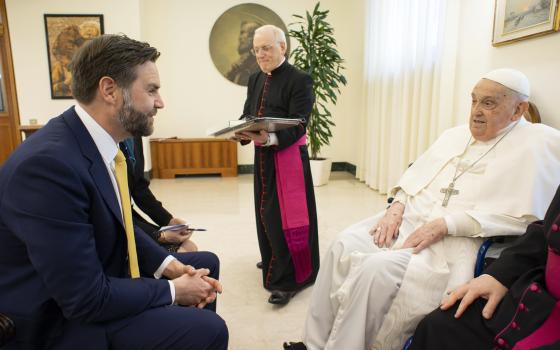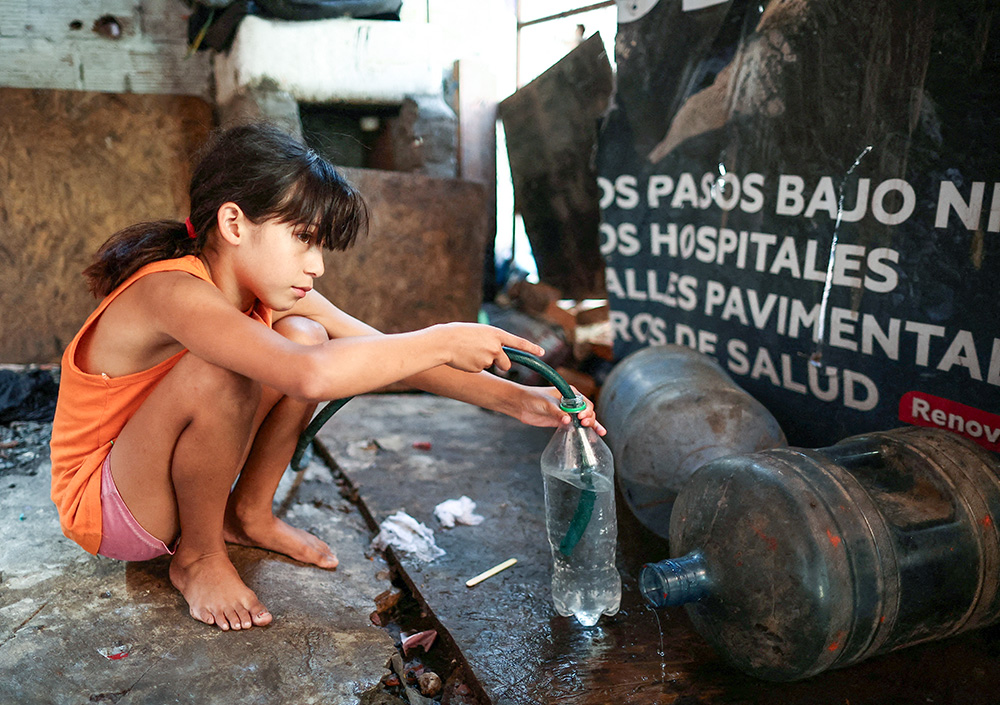
A girl fills a bottle with a hose to bring drinking water to her home in a poor section of Buenos Aires, Argentina, Feb. 27, 2024. (OSV News/Reuters/Agustin Marcarian)
Six weeks before delegates from 170 nations convened in Busan, South Korea, for the expected final round of negotiations on a treaty addressing plastic pollution, Boston College held a conference of its own on the topic.
"The purpose of this conference is to look at the global plastics crisis through the lens of ethics and morality," Dr. Philip Landrigan, director of the Jesuit school's Global Observatory on Planetary Health and its Program for Global Public Health and the Common Good, said at the start of the two-day event timed with the Oct. 4 feast day of St. Francis of Assisi, patron saint of ecology.
A year earlier, Landrigan, an epidemiologist and pediatrician seen as a leading advocate for children's environmental health, served as lead author on a landmark report that for the first time examined the full-scale health impacts of plastics across their life cycles. The 251-page report, published in the Annals of Global Public Health, served as the foundation for the Boston College conference.
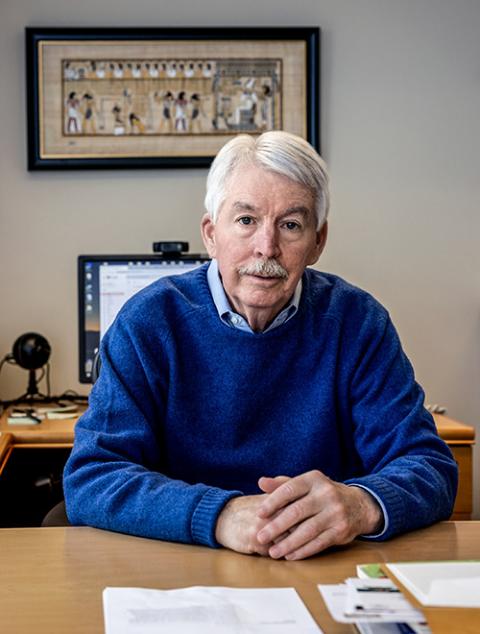
Dr. Philip Landrigan, director of Boston College's Global Observatory on Planetary Health and its Program for Global Public Health and the Common Good (Boston College/Caitlin Cunningham)
"It is now clear that current patterns of plastic production, use, and disposal are not sustainable and are responsible for significant harms to human health, the environment, and the economy as well as for deep societal injustices," the report concluded. "The main driver of these worsening harms is an almost exponential and still accelerating increase in global plastic production. Plastics' harms are further magnified by low rates of recovery and recycling and by the long persistence of plastic waste in the environment."
Plastics, the majority of which are created from fossil fuels, contain "thousands of toxic and cancer-causing chemicals that can leach out of the plastic at every stage," Landrigan said in an interview with Boston College following the report's publication. "And because plastic does not break down in the environment and less than 10 percent is recycled, an estimated six billion tons of chemical-laden plastic waste now contaminate the earth's environment. This is not sustainable."
For five decades, Landrigan has worked to improve public health in the U.S. and around the world. His research on lead poisoning, pesticides and toxic chemicals helped spur federal policy and legislation to address each. He also studied health issues facing 20,000 rescue workers on 9/11.
In 2022, the National Institute of Social Sciences awarded him its Gold Honor Medal. In addition, he has received the New York Academy of Medicine's Stephen Smith Medal for Lifetime Achievement in Public Health, and the Meritorious Service Medal from the U.S. Public Health Service.
Landrigan, a Boston College alum, spoke with EarthBeat days after the Busan negotiations adjourned Dec. 2 without a deal in place and with plans to restart sometime in 2025.
'A treaty on plastics is really a treaty that's going to protect public health, and a treaty that fails to control plastics is going to be a document that harms public health.'
—Dr. Philip Landrigan
"When the negotiators reconvene, wherever and whenever that is, they need to bear in mind that they're not just dealing with a technical issue of plastic waste on beaches or plastic in the bodies of sea birds and whales," Landrigan said. "They're talking about children's health, and there's a profoundly moral dimension of this. And they have to bear this in mind as they negotiate the treaty."
This interview has been edited for clarity and length.
EarthBeat: At the Boston College plastic conference, you expressed optimism the planet can address this plastic pollution problem, saying the impediments aren't technical or scientific but political, economic and about moral courage. After seeing how talks went in Busan, how are you feeling about the prospects of a plastics treaty?
Landrigan: Well, I was very disappointed by the outcome in Busan. I understand that the United Nations likes to operate by consensus and to get every country on board with any major program like a global treaty. But I think it's most unfortunate that one or two countries, in this case Saudi Arabia and Russia, can basically hold the world hostage.
Countries that labeled themselves the High Ambition Coalition were pushing for a treaty that had two key provisions: number one, some kind of a cap or limit on plastic production, and number two, a program to do something about all the toxic chemicals and the untested chemicals that are in plastic.
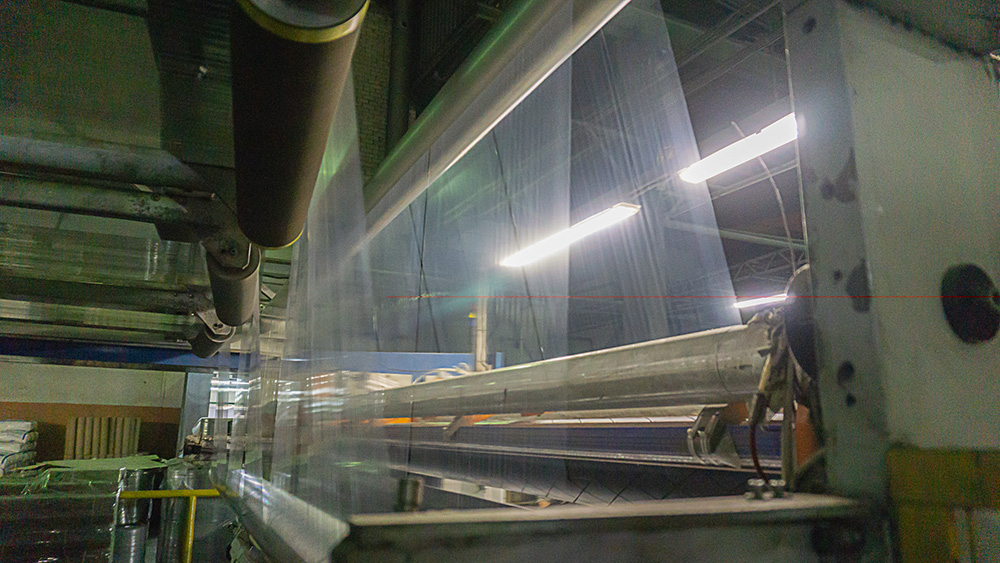
Plastic film that is commonly used for packaging is seen in production in a factory. (Dreamstime/Djvo16)
But I don't think all is lost. First of all, the 100 or so countries that comprise the High Ambition Coalition have had a year and a half now to really sharpen their message and really focus on what they really want out of the treaty, and it comes down to those two things I just mentioned. And there were some powerful expressions of support for a scientifically based treaty expressed at the [negotiations].
So I think there's going to be an awful lot of behind-the-scenes pressure between now and the next session to try to get it right. How that's going to play out in any detail, I have no idea, but I think there's going to be a lot of activity going on.
You mentioned the High Ambition Coalition. A number of countries said it was better to leave Busan without a deal in place, as opposed to a weak treaty.
I agree.
Is that a hopeful sign as well?
I think it's a sign of hope, because the High Ambition Coalition think that they can maybe do stuff between now and the next session to get a stronger treaty. And they didn't want to put a weak treaty on the books and then be stuck with it.
Advertisement
From a health perspective, what is the importance of this plastic treaty?
Well, the central point here is that plastic harms health at every stage of its life cycle.
Plastic production harms workers. It harms people who live around fracking wells, oil wells and production facilities. Plastic use causes harm because when people, especially children, are using plastics, toxic chemicals leach out of the plastics, get into them and cause disease and death.
And when it is disposed, and ends up in the form of plastic waste, plastic harms health because when that stuff is burned it releases toxics in the environment, it exposes kids to toxic plastic waste.
So basically, a treaty on plastics is really a treaty that's going to protect public health, and a treaty that fails to control plastics is going to be a document that harms public health. That's why it's so important to get it right.
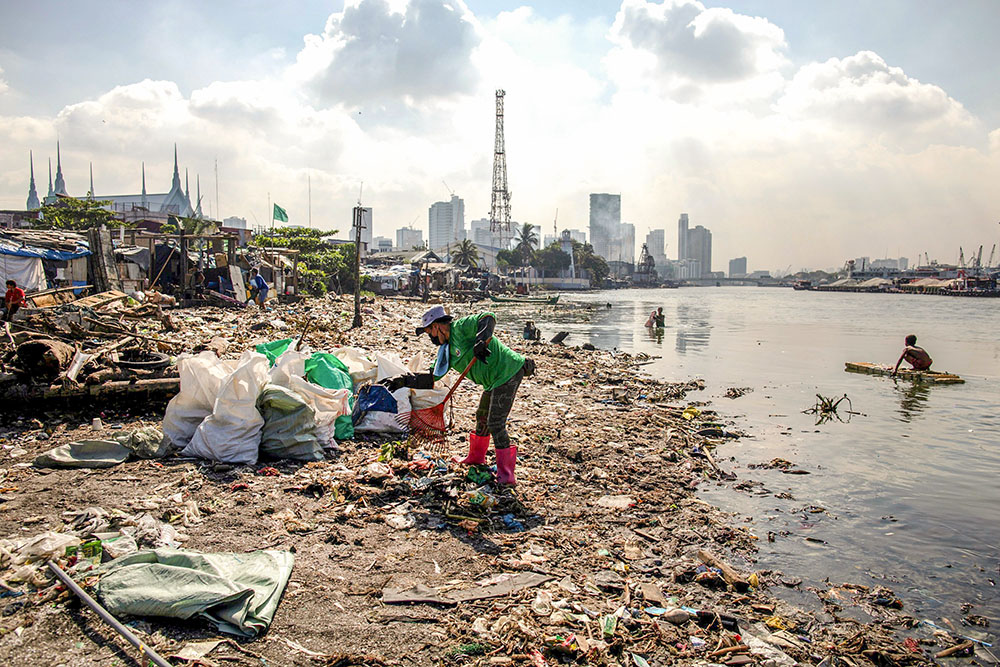
A member of River Warriors rakes through trash on the banks of the heavily polluted Pasig River in Manila, Philippines, June 18, 2021. The River Warriors is a group of volunteers founded more than a decade ago with the sole purpose to pick up garbage in and around the river. (CNS/Reuters/Eloisa Lopez)
And there's a very strong element of social justice here, which has to do with the fact that plastic harms fall disproportionately upon the poor and the vulnerable. And so a strong treaty is going to be ethically and morally defensible because it's going to protect the poor and the vulnerable. And a weak treaty is going to be much less defensible because it's not going to do a good job of protecting the weak.
Are there specific forms of plastic or specific ways that plastic pollution is a higher risk for infants and children?
The vulnerability does not pertain to any particular type of plastic.
In general, children are more vulnerable than adults to toxic chemicals. And the reason is, firstly, they're more heavily exposed pound per pound per body weight. They're more heavily exposed because they drink more water, they eat more food, they breathe more air per pound of body weight. So they bring into their bodies proportionally more of any toxic chemicals than an adult.
You and I don't chew on plastic, kids do. You and I don't roll on the floor, kids do. And so all of those things magnify their exposure.
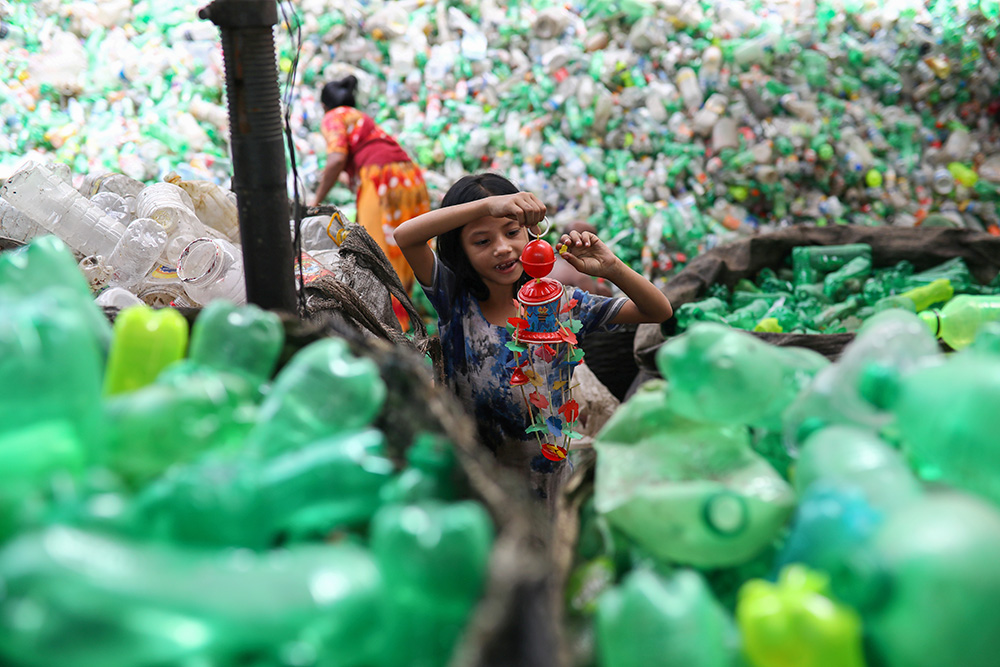
A girl plays with a toy found in a plastic recycling factory in Dhaka, Bangladesh, July 8, 2019. (CNS/Reuters/Mohammad Ponir Hossain)
And then on top of that, especially during the nine months of pregnancy, children's little bodies are growing and developing, and those processes of early development are very, very fragile and very easily disrupted by toxic chemicals.
So we know, for example, that if a pregnant mom gets phthalates into her body — phthalates are chemical widely used plastics — the risk goes up that her child will have reduced IQ, and if it's a male child will have reproductive birth defects of the male reproductive organs.
Childhood just has unique vulnerabilities that exist in no other life stage.
In a past interview on the plastics and health report, you mentioned it's unrealistic to have a world where there's no plastic products. Given that, are there specific types of plastics or forms of production you see especially important to be targeted for reduction or elimination in a treaty?
I think there should be at least two areas of target.
One is that some of the polymers are particularly toxic, most especially polyvinyl chloride. And I think a case could be made for phasing out polyvinyl chloride.
And second, the other form of plastic which is really problematic is single-use plastic, which now comprises something like 40% of total plastic manufacture and is the most rapidly growing segment of plastic production and contributes disproportionately to plastic waste.
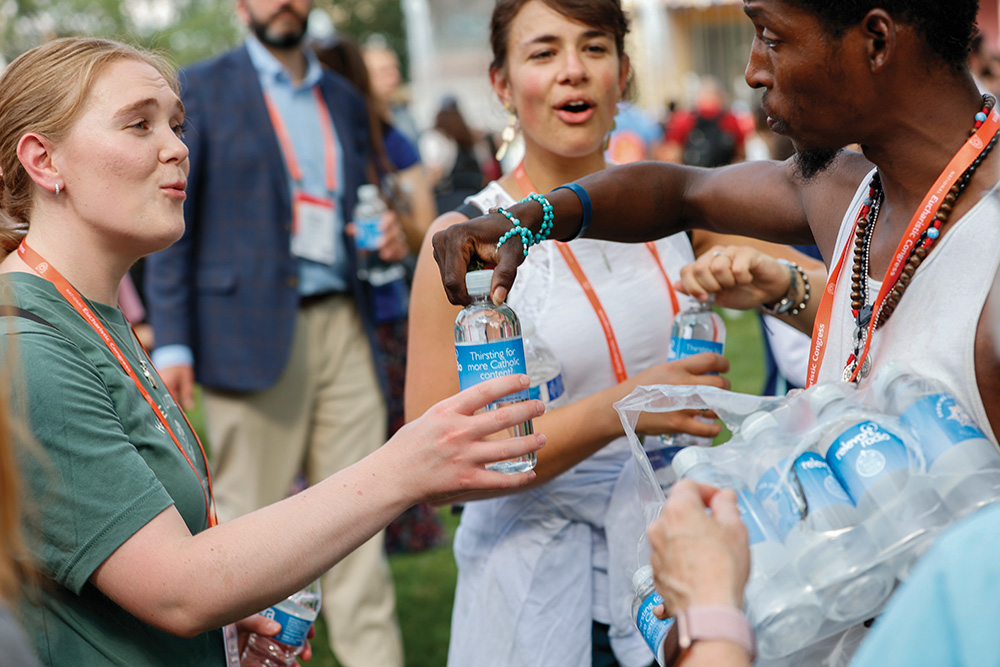
Pilgrims receive bottled water during the National Eucharistic Congress procession in Indianapolis July 20. (OSV News/Rhode Island Catholic/Rick Snizek)
You just think in your own life, all the single-use stuff that you use once and you throw it away: food wrappings, trash bags, bags from the dry cleaner, bags from the supermarket, plastic water bottles of course is a big one. None of those are necessary products.
Those are products that the plastic industry has cleverly devised over the last 10 or 20 years and basically placed on supermarket shelves. And those products could be done away with and replaced by glass and metal and other alternatives, [like] paper, relatively easily.
What is the toxic threat polyvinyl chloride poses, and what type of products is it often used?
PVC is a very widely used plastic. It's used to make pipe. It's used to make construction materials. Most of the plastic lawn furniture that you'll see is PVC, some interior furniture.
The reason it's a hazard has to do with the fact that the fundamental chemical structure of the stuff is based on a carbon-chlorine bond. The chlorine and the carbon atom are chemically joined to each other in the process, and that kind of a chemical bond basically makes it a persistent organic pollutant. This stuff persists in the environment for generations, just like DDT or PCBs; basically polyvinyl chloride is in the same family as those chemicals. So it's a persistent pollutant, which means it shouldn't be allowed to be made. That's one reason.
And the second reason is that when you burn PVC, which happens frequently, especially in the developing world, the combustion of any kind of plastic that contains chlorine releases dioxin into the atmosphere. Dioxin is a terribly toxic molecule that then goes into the air and it can be inhaled, and it's a very potent cause of cancer, birth defects, immune suppression.
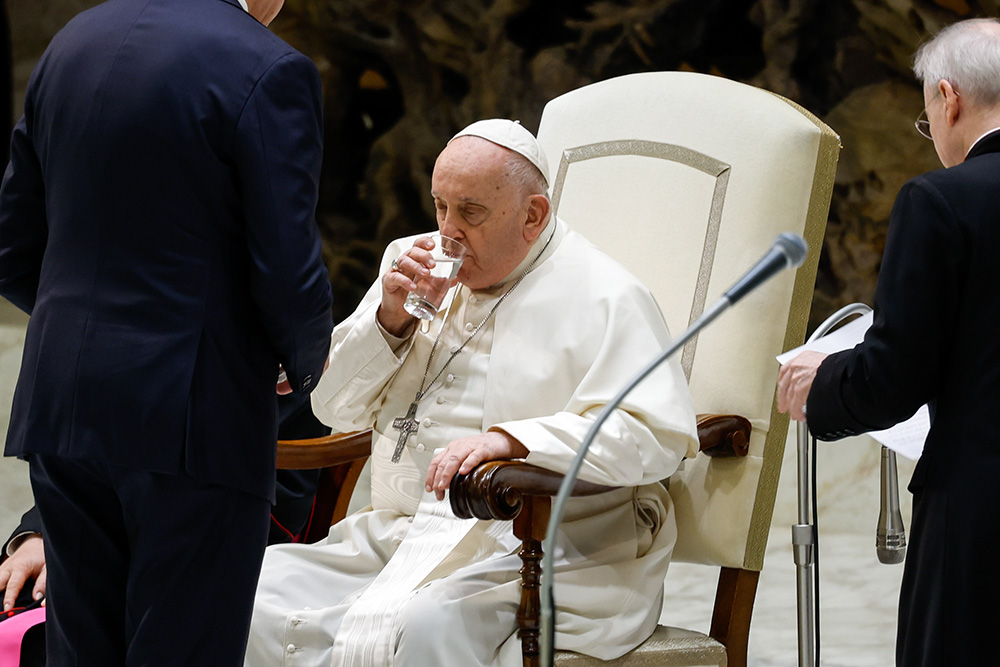
Pope Francis drinks water from a glass during his weekly general audience in the Paul VI Audience Hall at the Vatican Jan. 10, 2024. (CNS/Lola Gomez)
What are ways you think the Catholic Church could make a difference on this issue of plastic pollution? Is it something at the individual parish and school level, or is this a problem where it'd be more effective if there's a campaign or political advocacy aimed at larger-scale solutions?
I don't think they're mutually exclusive.
Let me put it this way, the pope has spoken out very eloquently about climate change. He's spoken out about pollution in general. In Laudato Si', he talks about the world turning into a garbage heap. And it would be good if he just were to follow up on that and say explicitly that the uncontrolled exponential growth in the production of plastic has become a powerful driver of the trashing of the Earth.
Laudato Si' was [issued in] 2015, so it's been almost a decade. And something like 35% of all plastic ever made has been produced in the decade since he published Laudato Si'. And something that was not such a big problem even a decade ago has become a huge problem now. So it's time to do a friendly amendment to Laudato Si' and say that plastic needs to be recognized as part of the problem, especially since like climate change and like air pollution, it all ties back to fossil fuels.
Then I think parishes, schools, hospitals — hospitals, for example, use an enormous amount of plastic. Some of it is essential, a lot of it is not. And Catholic hospital systems could be leaders in reducing their use of unnecessary plastics.
The Vatican in 2019 announced it was ending the sale of single-use plastics. Is that another step that Catholic institutions could follow?
It's a great example. It's a perfect role model, yes.




